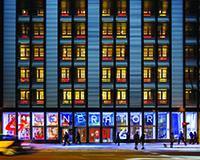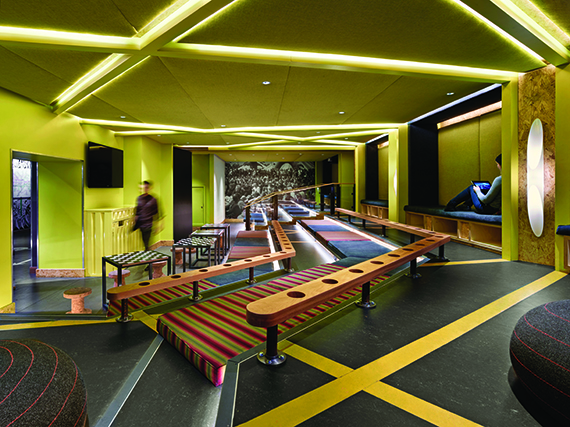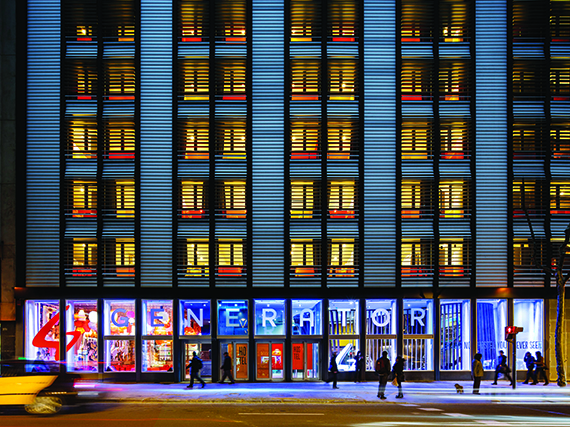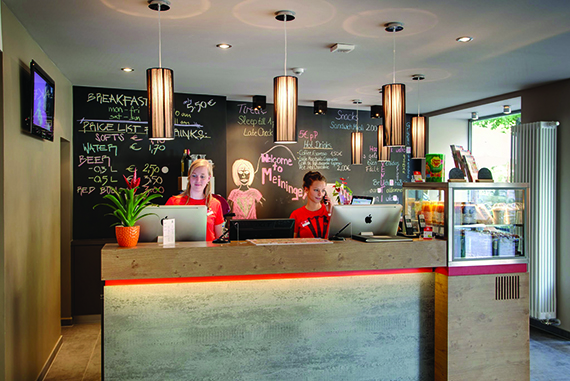Step into the bar/lobby/reception of the Generator in London’s Bloomsbury district and you could be forgiven for not immediately realising that you were standing a hostel.
The style is an unabashed mash-up of influences, with exposed bricks and beams, Moooi and Tom Dixon furniture, chilled lighting and a replica Routemaster bus. The black steel bar serves cocktails and break-out space abounds. It resembles nothing so much as a hipster take on the HQ of a dotcom start-up, circa 1998.
Design is important to Generator, which operates eight hostels in seven European cities. Its London property, which opened in 1995, underwent a thorough revamp earlier this year and is now so achingly hip you’d think it had a massive beard: the Berlin and Venice branches have already won design awards. It is a far cry from the shabby hostels of the last century, with their well-kept but dull common areas, boarding school dormitories and the atmosphere of a church hall.
And this revolution is happening across the entire sector.
“The traditional image of a hostel is providing low-cost accommodation in shared dorms to young backpackers on a tight budget,” says Savills’ head of hotel valuation, Tim Stoyle. “And on the whole this is still the case.”
However, under pressure to provide ever more class and style to an increasingly demanding youth demographic, and keen to broaden their appeal to families and even businesses, hostels are getting funky.
“Hostels have been attempting to shake off that fusty, stale image for a decade or so,” says HVS partner Harry Douglass, who recently completed a year-long secondment to hostel giant Meininger.
This is not new, he says, but a re-emerging trend. “We have been through the same debate in the past. But this time it has gained far more traction.”
To see why, one must look at the changing global picture, and especially at emerging markets. Visa restrictions, which previously prevented the youth of China visiting Europe and beyond, have been relaxed. Travellers from India and south east Asia have also increased. Indeed, Staywyse and UNWTO forecast that international “youth” trips will grow from 190m to 290m by 2020.
And, vitally, there is still a dearth of low-cost places to stay in popular tourist centres such as London and Paris.
Because of this, and the fact that they tend to exist only in areas of maximum tourist saturation, hostel occupancy, though measured by bed, not room, often exceeds that of the local hotel market. Generator Dublin, for instance, has benefited from a 616% increase in occupancy over the past 18 months.
But alongside this, it is no longer acceptable to simply provide a bunk bed in a dorm and expect the backpackers and schools and youth groups to make your business profitable.
Higher standards are now expected and, with that, slightly higher prices. “If I stay somewhere for £30 a night, I don’t expect to get breakfast,” says Douglass. “If it costs £20 and the breakfast is included, I’ll avoid the sausages.”
Indeed, he maintains that it was the insistence of youth groups that hostels raise their standards, which has led to the improved offer and attracted new markets.
In Europe, if not yet in the US, hostels are becoming regarded as cost-effective alternatives to a hotel, not just for young people or stag dos, but for families and even corporate travellers.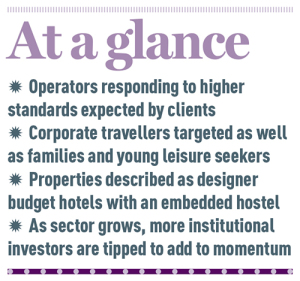
The blurring of the lines has led to the coining of a somewhat awkward neologism, the ho[s]tel. As if to prove the point, when travel company Cox & Kings bought Meininger in 2013, its stated aim was to create a leading hotel group that combined the hostel and hotel market. (See box, facing page)
Navneet Bali, who became chief executive of Meininger after the sale, describes its particular product as a designer budget hotel with a hostel embedded inside.
Glamping, flashpacking and the emergence of ho[s]tels has led to US billionaire investor Ronald Burkle developing a group of luxury hostel resorts under the banner Freehand. He now plans to spend $250m on 10 more sites in the US.
What the ho[s]tel operators want to do is combine hotel services and standards with the affordability and affability of a hostel. Staff costs are also historically low because fewer, less-skilled staff are needed.
But it is the rent that is preventing the likes of Generator and Meininger taking over the world. HVS estimates the bottom line pre-tax net operating income before rent and/or financing costs generated by commercial hostels can range from 25% to 30% of total revenue. In other words, rents have to be low to be sustainable.
“In the UK that is harder,” says Douglass. “There is a lot more competition, and rents for hostels are more in line as limited service hotels.”
A&O, for instance, is a huge concern in Europe, operating 27 hostels in 18 cities. The reason they haven’t gone to London? They haven’t found anything, anywhere that they can rent for the right – not much – money.
What is apparent is that this is a winning formula, and one that is interesting investors. Patron Capital, which owns Generator, is understood to be looking at an IPO in the not too distant future and progress is being monitored.
For the smaller players, which tend to have more freeholds, op-co/prop-co models are being proposed. “It will be at this point where we may see institutional investment,” says Stoyle.
And this interest, too, is leading to operators improving the hostel offer. After all, if you glam it up a bit, you can charge more, whether what you are selling is a bed or a company. But glam it up too much, and it will lose its unique appeal.
Generator’s city breaks
In August 2007 Patron Capital, which has interests in everything from healthcare to football leagues, bought the family-owned Generator Hostels.
Generator, then, was just two hostels, one in Berlin and the flagship in London. Since Patron’s purchase, seven more properties have been added to the portfolio, in Hamburg, Berlin (Mitte), Copenhagen, Dublin, Barcelona and Venice. Next year it plans to open in Paris and Rome, and more Italian cities are on the wish list.
Patron plans to have 15 properties and 12,500 beds by 2018.
Meininger develops a Global vision
Named after the street on which its first hotel stood, until last year Meininger was still owned by Meininger Holding GmbH.
But, beginning in 2010, the company was gradually sold to Cox & Kings, the India-based travel giant. In November 2010 its European arm, Holidaybreak, bought a 50% share in the company, with the option to purchase the remaining shares. A second slice of 24% was bought in April 2012 and the last chunk in April 2013.
Since then it has brought in a new executive team, led by CEO Navneet Bali, and has started looking at aggressive expansion.
It has 16 hotel/hostels – nine in Germany, four in Austria and one each in Amsterdam, Brussels and London.
Meininger’s model is a pure operating company, with the hotels leased from owners on 20-year index-linked leases. Although some hotels are new-build the operator tends to convert existing buildings.
By 2019, Bali has said, it plans to have 50 hotels with around 18,000 beds.
Meininger’s stated aim is to be in every major city in Europe, and at the top of the wish list for now are Barcelona, Florence, Madrid, Paris, Rome and Venice. Further afield it is eyeing Bangkok, Buenos Aires, Hong Kong, New York, Rio de Janeiro, San Francisco, Sydney and Tokyo.
Food and Drink
One area hostel operators such as Generator and Meininger are looking at with great interest is food and beverage sales. And it can be a double-edged sword.
“Operators are focused on bed sales, so F&B revenue varies considerably,” says HVS’s Harry Douglass. Indeed, across the board, F&B is consistent with conventional bed and breakfasts, accounting for less than 15% of incomes.
However, profitability may be up to 65%, largely due to sales of alcohol at the in-house bars or, more usually, from behind the reception desk.
Many operators, says Douglass, are feeling the pressure to provide more food and drink to increase profitability.
Some, such as Generator in London, have done away with the hostel’s traditional hybrid reception desk/bar, in favour of something far more, well, bar-like.
“The problem is that at some point you will stop taking cash for a bottle taken from a fridge behind the desk,” says Douglass. “You will scan it and it will appear on the bill at the end. It will become more commercial.”
That, he says, is something all operators want to avoid. “They know why people stay in these places. They want to avoid that corporate feel.”
Another reason for avoiding upping the F&B element is that, without it, hostels can make some valuable allies, which may help them get into new developments. Hostels, on full bed occupancy, provide a remarkably dense hotel occupation. “A Generator or Meininger will suddenly produce 1,500 people to feed,” says Douglass. “So any new development would provide a perfect opportunity for a restaurant or bar to co-locate.”







